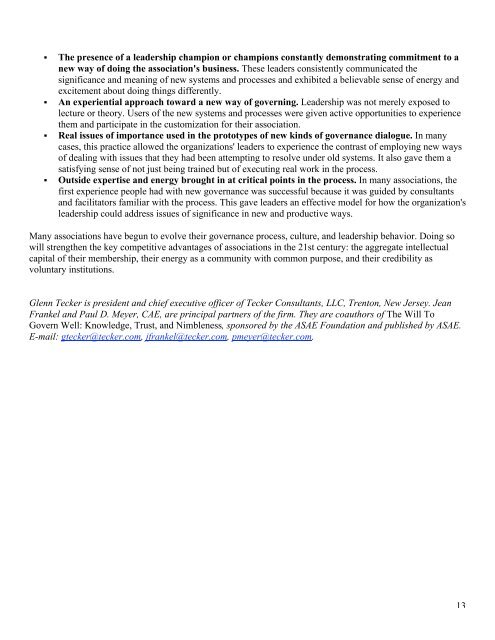1 Toward's Better Governance Editor's note: This is the first of a two ...
1 Toward's Better Governance Editor's note: This is the first of a two ...
1 Toward's Better Governance Editor's note: This is the first of a two ...
Create successful ePaper yourself
Turn your PDF publications into a flip-book with our unique Google optimized e-Paper software.
The presence <strong>of</strong> a leadership champion or champions constantly demonstrating commitment to anew way <strong>of</strong> doing <strong>the</strong> association's business. These leaders cons<strong>is</strong>tently communicated <strong>the</strong>significance and meaning <strong>of</strong> new systems and processes and exhibited a believable sense <strong>of</strong> energy andexcitement about doing things differently.An experiential approach toward a new way <strong>of</strong> governing. Leadership was not merely exposed tolecture or <strong>the</strong>ory. Users <strong>of</strong> <strong>the</strong> new systems and processes were given active opportunities to experience<strong>the</strong>m and participate in <strong>the</strong> customization for <strong>the</strong>ir association.Real <strong>is</strong>sues <strong>of</strong> importance used in <strong>the</strong> prototypes <strong>of</strong> new kinds <strong>of</strong> governance dialogue. In manycases, th<strong>is</strong> practice allowed <strong>the</strong> organizations' leaders to experience <strong>the</strong> contrast <strong>of</strong> employing new ways<strong>of</strong> dealing with <strong>is</strong>sues that <strong>the</strong>y had been attempting to resolve under old systems. It also gave <strong>the</strong>m asat<strong>is</strong>fying sense <strong>of</strong> not just being trained but <strong>of</strong> executing real work in <strong>the</strong> process.Outside expert<strong>is</strong>e and energy brought in at critical points in <strong>the</strong> process. In many associations, <strong>the</strong><strong>first</strong> experience people had with new governance was successful because it was guided by consultantsand facilitators familiar with <strong>the</strong> process. <strong>Th<strong>is</strong></strong> gave leaders an effective model for how <strong>the</strong> organization'sleadership could address <strong>is</strong>sues <strong>of</strong> significance in new and productive ways.Many associations have begun to evolve <strong>the</strong>ir governance process, culture, and leadership behavior. Doing sowill streng<strong>the</strong>n <strong>the</strong> key competitive advantages <strong>of</strong> associations in <strong>the</strong> 21st century: <strong>the</strong> aggregate intellectualcapital <strong>of</strong> <strong>the</strong>ir membership, <strong>the</strong>ir energy as a community with common purpose, and <strong>the</strong>ir credibility asvoluntary institutions.Glenn Tecker <strong>is</strong> president and chief executive <strong>of</strong>ficer <strong>of</strong> Tecker Consultants, LLC, Trenton, New Jersey. JeanFrankel and Paul D. Meyer, CAE, are principal partners <strong>of</strong> <strong>the</strong> firm. They are coauthors <strong>of</strong> The Will ToGovern Well: Knowledge, Trust, and Nimbleness, sponsored by <strong>the</strong> ASAE Foundation and publ<strong>is</strong>hed by ASAE.E-mail: gtecker@tecker.com, jfrankel@tecker.com, pmeyer@tecker.com.13
















